| dc.contributor.advisor | Werle, Gerhard | |
| dc.contributor.author | Wafula, Tumani Regina | |
| dc.date.accessioned | 2015-11-03T23:00:44Z | |
| dc.date.available | 2015-11-03T23:00:44Z | |
| dc.date.issued | 2012 | |
| dc.identifier.uri | http://hdl.handle.net/11394/4632 | |
| dc.description | Magister Legum - LLM | en_US |
| dc.description.abstract | The new Kenyan constitution has introduced an immediate monist approach of implementing international legal standards. Accordingly, the transformation from dual to monism will necessitate a discussion of theories of incorporation of international instruments into national laws. This will set the basis of what method Kenya should follow. This paper attempts to address potential procedural problems with implementing the Rome Statute in a new monist Kenya and will argue that as a precautionary measure during the country’s transition any deviation, by the court, from national law will require articulation and justification under an international framework. It will include a review of the Kenyan International Crimes Act 2003 (ICA) and its adoption into the domestic law of Kenya. It will also include examination of previous situations where domestic courts have applied international law standards in domestic trials before and after the monist Constitution of 2010. This paper aims at assessing the key challenges to the effective implementation of the Rome Statute in Kenya both objectively and substantively. It examines the challenges facing the Kenyan courts in relation to the exercise of universal jurisdiction and the criminalization of international crimes. It will seek to point out the weaknesses and conflict between the Kenyan constitution, The International Crimes Act and the Rome Statute. The ICA was silent on some aspects of the Rome Statute and the paper will attempt to discuss these issues and what they portend in the implementation of the Rome statute in monism. It will also discuss the effect of the new constitution on the practical operation of the Rome Statue. The operational capacity of institutions mandated with practical implementation of the Rome Statute will be examined. It will further seek to ascertain whether the laws and policies reflect Kenya’s commitment to international criminal justice. By way of conclusion, the paper will create a possible inventory of issues, which might arise in Kenya’s prosecution of International crimes under the Rome Statute, and suggestions on how such issues could best be addressed. | en_US |
| dc.language.iso | en | en_US |
| dc.publisher | University of the Western Cape | en_US |
| dc.subject | Domestic Courts | en_US |
| dc.subject | Dualism | en_US |
| dc.subject | Rome statute | en_US |
| dc.subject | International Criminal Court | en_US |
| dc.subject | Kenya | en_US |
| dc.title | Implementation of the Rome statute in Kenya : legal and institutional challenges in relation to the change from dualism to monism | en_US |
| dc.rights.holder | University of the Western Cape | en_US |

